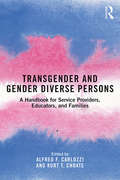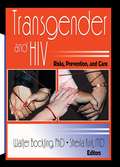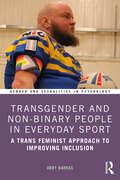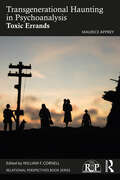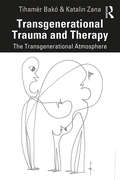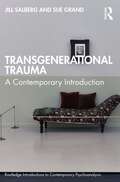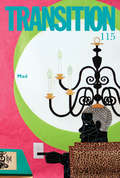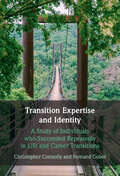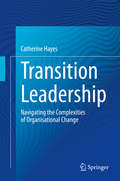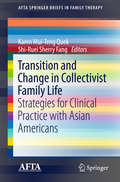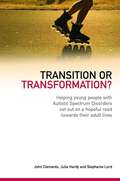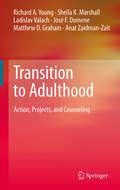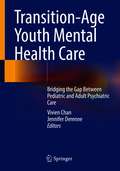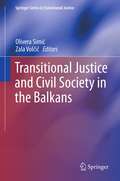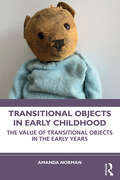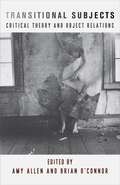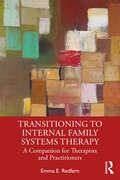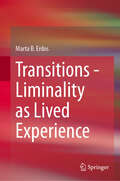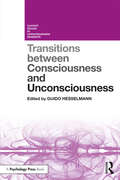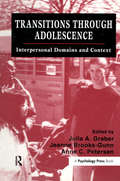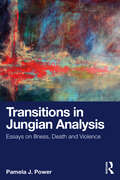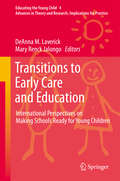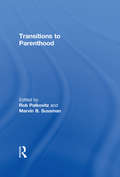- Table View
- List View
Transgender and Gender Diverse Persons: A Handbook for Service Providers, Educators, and Families
by Alfred F. Carlozzi Kurt T. ChoateTransgender and Gender Diverse Persons offers mental health professionals and other caregivers information and best practices for working with transgender and gender diverse persons and their families. In each chapter, experts from a variety of fields provide an accessible introduction to medical, legal, educational, and spiritual care for transgender and gender diverse adults and youth within a range of contexts, including communities and schools in urban and non-urban settings. Appendices include helpful suggestions for online resources, as well as additional reading for practitioners, clients, and their families. With rich examples and personal narratives woven throughout, this is an essential reference for mental health professionals, as well as other service providers, educators, and family members seeking to address the needs of transgender and gender diverse persons in an up-to-date, inclusive manner.
Transgender and HIV: Risks, Prevention, and Care
by Edmond J Coleman Walter O Bockting Sheila KirkDeliver effective services to this growing population! This volume presents the first collection of reports on the impact of HIV/AIDS on the transgender community worldwide. It includes a thorough description of the unique HIV risks of transgender people and exposes their largely neglected health and social service needs. This unique book also reports on the first generation of prevention interventions targeting this community, discusses guidelines for providing sex reassignment services to HIV-positive transsexuals, and encourages collaboration between communities at risk, researchers, and people in the helping professions.The social stigma faced by this population adds to their risk of HIV infection. Low self-esteem, rejection, neglect, employment discrimination, disenfranchisement, and a desire for acceptance and validation are all contributing factors. Yet, as the editors point out, “On the positive side, the transgender community has been able to mobilize and empower itself, and has found a voice that no longer can be ignored. We call on transgender and nontransgender people alike to work together to advance HIV prevention and promote our sexual health.”In Transgender and HIV you'll encounter: extensive discussions of the health, social service, and HIV prevention needs of the transgender community tips on how to work with marginalized communities in an empowering way explorations of the sexuality of both male-to-female and female-to-male transsexuals first-ever findings on sex reassignment surgery on HIV-positive individuals guidelines for surgery on HIV-positive transsexualsTransgender and HIV provides much-needed and often-requested information on HIV prevalence, risks, prevention, and care for this increasingly visible community.
Transgender and Non-Binary People in Everyday Sport: A Trans Feminist Approach to Improving Inclusion (Gender and Sexualities in Psychology)
by Abby BarrasThis formative work discusses transgender people’s inclusion in everyday sport in the United Kingdom. It adopts a trans feminist approach to explore pivotal issues regarding the barriers to participation faced by transgender and non-binary people.Offering a critical perspective on the current landscape surrounding this topic, the book draws from insightful interviews conducted by the author with 18 transgender and non-binary individuals. The author uses a critical social science approach to explore the heteropatriarchal construction of sport in the modern industrialised West, and how this has formed the backdrop to the continuing discrimination towards many athletes, not just those who are transgender. Using first-hand perspectives, it focuses on the three themes of the sporting body, sporting spaces and sporting communities. It investigates why conversations about fairness and safety regarding transgender athletes have become so polarised within the media, and the significance of taking a trans feminist approach to reducing barriers in sport. Lastly, the book’s key findings initiate a dialogue on the importance of gender affirmation in sport, the value of supportive teammates/role models and how sporting spaces can be reimagined to promote greater inclusion for all.Transgender and Non-Binary People in Everyday Sport is a crucial resource for researchers, academics, and students in the field of social science, sports organisations, policy makers, third-sector organisations, activists and other related disciplines. The book will also be a compelling read for anyone with an interest in improving inclusion for transgender and non-binary people in everyday sport and wants to learn more about how trans feminism can achieve this.
Transgenerational Haunting in Psychoanalysis: Toxic Errands (Relational Perspectives Book Series)
by Maurice AppreyIn this book, Maurice Apprey continues his unique work on transgenerational haunting to explore how events in our ancestors' lives may be renegotiated and re-subjectivized in the present from within the therapeutic dyad. With an informed and impassioned voice that evokes the tragic psychic consequences of the unresolved, silenced tragedies and transgressions that haunt subsequent generations, Apprey illustrates how the analyst can unfold a patient's transference wishes and emancipate them from the unconscious projects, or errands, they have inherited. This can happen through a threefold process of excavating the unconscious sedimentations of ancestral history, appropriating and reactivating the ancestral errands within the transference, and subsequently decoding the patient's transference pressures. Expanding on Apprey's work about the analyst's field of inquiry and ways of listening in clinical practice, this book illuminates the potential for a resolution, rather than a re-enactment, of the traumas that can haunt a family system across generations. Attending to the manifestation of transgenerational trauma through varied clinical material, and informed by the thinking of Sigmund Freud, among others, this book will be essential reading for all psychoanalysts and psychotherapists.
Transgenerational Trauma and Therapy: The Transgenerational Atmosphere
by Tihamér Bakó Katalin ZanaTransgenerational Trauma and Therapy presents the transgenerational, psychological impacts of trauma, and the clinical work on it. The book's expansive insight explores the psychology of the massive, collective trauma, and provides new ways of understanding the serious after-effects of man-made suffering. In this book, Bakó and Zana employ their original concept, "the transgenerational atmosphere", to fully comprehend many familiar phenomena in a new theoretical framework, exploring the psychological impact of trauma on the first generation, the mode of transmission, the effects on future generations, and therapeutic considerations. Crucially, Transgenerational Trauma and Therapy explores the psychological effects of collective, societal traumas on whole groups of individuals. Beginning with the direct, deep psychological effects of individual trauma, and then exploring the impact of collective trauma over generations , it deals particularly with the role of the social environment in the processing of trauma, as well as its hereditary transmission. Rich in clinical material and methodological suggestions, Transgenerational Trauma and Therapy will appeal to mental health professionals, including psychiatrists, psychologists, psychoanalysts, and social workers, in addition to professors in other academic disciplines, such as sociology, history, philosophy, and anthropology.
Transgenerational Trauma: A Contemporary Introduction (Routledge Introductions to Contemporary Psychoanalysis)
by Sue Grand Jill SalbergIn this book, Jill Salberg and Sue Grand offer an overview of the psychoanalytic work on transgenerational trauma, rooting their perspective in attachment theory, and the social-ethical turn of Relational psychoanalysis.Transgenerational Trauma: A Contemporary Introduction is a cutting-edge study of trauma transmission across generations. Salberg and Grand consider how our forebears' trauma can leave a scar on our lives, our bodies, and on our world. They posit that, too often, we re-cycle the social violence that we were subjected to. Their unique approach embraces diverse psychoanalytic and psychodynamic theories, as they look at attachment, legacies of violence, and the role of witnessing in healing. Clinical and personal stories are interwoven with theory to elucidate the socio-historical positions that we inherit and live out. Social justice concerns are addressed throughout, in a mission to heal both individual and collective wounds.Transgenerational Trauma: A Contemporary Introduction offers a nuanced and comprehensive approach to this vital topic, and will be of interest to psychoanalysts, psychologists and other mental health professionals, as well as students and scholars of trauma studies, race and gender studies, sociology, conflict resolution, and others.
Transition Expertise and Identity: A Study of Individuals Who Succeeded Repeatedly in Life and Career Transitions
by Fernand Gobet Christopher ConnollyThrough a systematic review of relevant literature and an analysis of in-depth interviews with key expert performers, this book examines the nature of expertise that enables individuals to make repeated successful transitions over the course of their career. Focusing on business, sports, and music, it examines the roles of motivation, cognitive flexibility, personal intelligence, generative thinking, and contextual intelligence in this process. It further shows how identity changes and adapts during a career transition and how self concept evolves over the course of a career. This book has wide appeal for academics in psychology, sports, music, and business, as well as coaches, mentors, talent management, and training organisations across these domains.
Transition Leadership: Navigating the Complexities of Organisational Change
by Catherine HayesIntegrating practitioner research with Buddhist philosophy, business and clinical psychology, this book provides a new perspective on leading change in organisations, supporting leaders and change professionals with insight into useful practices for today’s business environment. It identifies the unseen and overlooked complexities of the transition space, helping leaders to recognize patterns in their own leadership practices. This volume includes approaches for working at the intersection of complexity and ambiguity, and discusses how different mindsets impact behavior and outcomes which may get in the way of change agendas. It focuses on approaches for navigating the challenges of organisational transitions, while developing sustainable transition capabilities and practices A comprehensive new framework for understanding and shaping business management, Transition Leadership is a valuable resource for students and researches of business practices, work psychology, and transition and change, as well as current and future business and organizational leaders.
Transition and Change in Collectivist Family Life: Strategies for Clinical Practice with Asian Americans (AFTA SpringerBriefs in Family Therapy)
by Karen Mui-Teng Quek Shi-Ruei Sherry FangThis research-to-practice volume grounds clinicians in a robust, culturally-informed framework for conducting effective therapy with Asian-American couples, families, and individuals. Family, cultural, social, and spiritual dynamics are explored across ethnicities, generations, relationships, and immigrant/citizen experience to reflect a diverse, growing population. Discussion and case examples focus on contrasts, conflicts, and balances involved in acculturation and change, notably the shift from collectivist cultural tradition to a more independent view of the self, gender, choices, and relationships. The contributors’ finely shaded guidance and accessible approach will help therapists provide appropriate services for Asian-American clients without minimizing or pathologizing their experiences.Included in the coverage:How Asian American couples negotiate relational harmony: collectivism and gender equality.Through religion: working-class Korean immigrant women negotiate patriarchy.The role of Chinese grandparents in their adult children’s parenting practices in the United States.Balancing the old and the new: the case of second generation Filipino American women.Bicultural identity as a protective factor among Southeast Asian American youth who have witnessed domestic violence. Transition and Change in Collectivist Family Life is a cogent clinical resource for practitioners and mental health professionals with interests in Asian-American family therapy, psychotherapy, collectivism, and faith-based community and counseling.
Transition or Transformation?
by John Clements Julia Hardy Stephanie LordYoung people with Autism Spectrum Disorders (ASDs) can often find the step into adulthood and independence more difficult than their neurotypical peers, particularly where employment is concerned. The authors show, however, that with the right guidance and a positive attitude in schools, young people with ASDs can be every bit as happy and successful as those who are not on the spectrum. The book describes a programme developed over a number of years by teachers at a school for young people with ASDs, which successfully enabled autistic pupils to achieve their full potential. The authors explain in detail the challenges faced by the young people at the school, and show how, encouraged by a culture of optimism and hopefulness, the programme developed their confidence and skills, with the result that many of them are now in employment. The book also provides an in-depth exploration of a multitude of styles and techniques for building relationships. Concluding with a reflection on leadership and organisational culture, the authors demonstrate that if the approach is adopted by an entire school and not just a handful of teachers, it really can work. This inspiring and innovative book will be a must for educators at every level, psychologists, academics, and anybody else interested in a positive educational approach that will enable young people with ASDs to get the most out of life.
Transition to Adulthood
by Richard A. Young Anat Zaidman-Zait Ladislav Valach Sheila K. Marshall José F. Domene Matthew D. GrahamThe transition to adulthood involves, for most individuals, moving from school to work, establishment of long-term relationships, possibly parenting, and a number of other psychosocial transformations. Now more than ever, there is a concern within popular and research literature about children growing up too soon or too late or failing to realize changes associated with being adult. With this in mind, the book intends to answer a series of timely questions in regard to transition to adulthood and propose a wholly new approach to counseling that enables youth to engage fully in their lives and achieve their best. Active Transition to Adulthood: A New Approach for Counseling will discuss the authors' work on the transition to adulthood (including early and late adolescence) from an entirely innovative perspective - action theory. Over a period of 10-15 years the authors have collected substantial data on adolescents and youth in transition, and will present an approach to counseling based on these data and cases. The action theory perspective in which the authors have grounded their work addresses the intentional, goal-directed behavior of persons and groups that is expressed through particular actions, longer-term projects, and life-encompassing careers. In this book, both transition to adulthood and counseling will be covered in the language of goal-directed action. In this way both transition and counseling reflect and capture the action, projects, and careers in which families, youth, and clients are engaged and use to construct on-going identity and other narratives.
Transition-Age Youth Mental Health Care: Bridging the Gap Between Pediatric and Adult Psychiatric Care
by Jennifer Derenne Vivien ChanOver the course of the last two decades, improved practices in child and adolescent mental healthcare have led to a decreased environment of stigma, which also led to an increased identification and treatment of mental health disorders in children and youth. Considering that treatment and outcomes are improved with early intervention, this is good news. However, the success gained in the field of child and adolescent psychiatry leads to a new challenge: transitioning from adolescent care to adult care. It has been known for some time that children, adult, and geriatric patients all have unique needs where it comes to mental healthcare, yet limited work has been done where it comes to the shifting of the lifespan. Where it comes to the child-adult transition—defined as those in their late teens and early/mid-20s—there can be multiple barriers in seeking mental healthcare that stem from age-appropriate developmental approaches as well as include systems of care needs. Apart from increasing childhood intervention, the problem is exacerbated by the changing social dynamics: more youths are attending college rather than diving straight into the workforce, but for various reasons these youths can be more dependent on their parents more than previous generations. Technology has improved the daily lives of many, but it has also created a new layer of complications in the mental health world. The quality and amount of access to care between those with a certain level of privilege and those who do not have this privilege is sharp, creating more complicating factors for people in this age range. Such societal change has unfolded so rapidly that training programs have not had an opportunity to catch up, which has created a crisis for care. Efforts to modernize the approach to this unique age group are still young, and so no resource exists for any clinicians at any phase in their career. This book aims to serve as the first concise guide to fill this gap in the literature. The book will be edited by two leading figures in transition age youth, both of whom are at institutions that have been at the forefront of this clinical work and research. This proposed mid-sized guide is therefore intended to be a collaborative effort, written primarily by child and adolescent psychiatrists, and also with adult psychiatrists. The aim is to discuss the developmental presentation of many common mental health diagnoses and topics in chapters, with each chapter containing clinically-relevant “bullet points” and/or salient features that receiving providers, who are generally, adult-trained, should keep in mind when continuing mental health treatment from the child and adolescent system. Chapters will cover a wide range of challenges that are unique to transition-age youths, including their unique developmental needs, anxiety, mood, and personality disorders at the interface of this development, trauma and adjustment disorders, special populations, and a wide range of other topics. Each chapter will begin with a clinical pearl about each topic before delving into the specifics.
Transitional Justice and Civil Society in the Balkans
by Olivera Simić Zala VolčičTransitional Justice and Civil Society in the Balkans covers civil society engagements with transitional justice processes in the Balkans. The Balkans are a region marked by the post-communist and post-conflict transitional turmoil through which its countries are going through. This volume is intended to provide a comprehensive introduction to research in transitional justice in this part of the world, mostly written by local scholars. Transitional justice is ever-growing field which responds to dilemmas over how successor regimes should deal with past human rights abuses of their authoritarian predecessors. The editors and author emphasize the relatively unexplored and under-researched role of civil society groups and social movements, such as local women's groups, the role of art and community media and other grass-roots transitional justice mechanisms and initiatives. Through specific case-studies, the unique contribution of this volume is not only that it covers a part of the world that is not adequately represented in transitional justice field, but also that the volume is the first project originally researched and written by experts and scholars from the region or in collaboration with international scholars.
Transitional Objects in Early Childhood: The Value of Transitional Objects in the Early Years
by Amanda NormanIn this innovative book, Amanda Norman looks at D. W. Winnicott’s theory of Transitional Objects in early years practice, the ‘good-enough’ parent, and the relationship between the young child and primary carer in relation to the value of Transitional Objects.Norman looks at how an understanding of psychological theories can be useful when caring for young children in both educational and research contexts, aiding those interested in understanding therapeutic relationships, and applying the principles to promote the use of Transitional Objects in their work. Throughout the book, Norman uses case studies from parents, children, and practitioner’s perspectives in supporting physical and emotional development. Through these, she shows how observing Transitional Objects is particularly relevant to living in the west, where a low touch, high technology culture prevails, compounded by the recent pandemic. This volume contributes to a timely connection between the understanding and application of therapeutic approaches within early educational contexts. Including engaging exercises at the end of each chapter, this book is a perfect companion for those approaching the concept of Transitional Objects for the first time.Transitional Objects in Early Childhood is vital reading for those with an interest in the psychology of the infant/young child and their relationship and realities with the external world. It will be of particular interest to those specialising in infant and child care who wish to develop their knowledge of emotional development through play, as well as those working in a variety of social, education, and health contexts.
Transitional Subjects: Critical Theory and Object Relations (New Directions in Critical Theory #67)
by Amy Allen Axel Honneth C. Fred Alford James Martel Owen Hulatt Joel Whitebook Johanna Meehan Noëlle McAfee Alessandro Ferrera Sara BeardsworthCritical social theory has long been marked by a deep, creative, and productive relationship with psychoanalysis. Whereas Freud and Fromm were important cornerstones for the early Frankfurt School, recent thinkers have drawn on the object-relations school of psychoanalysis. Transitional Subjects is the first book-length collection devoted to the engagement of critical theory with the work of Melanie Klein, Donald Winnicott, and other members of this school. Featuring contributions from some of the leading figures working in both of these fields, including Axel Honneth, Joel Whitebook, Noëlle McAfee, Sara Beardsworth, and C. Fred Alford, it provides a synoptic overview of current research at the intersection of these two theoretical traditions while also opening up space for further innovations.Transitional Subjects offers a range of perspectives on the critical potential of object-relations psychoanalysis, including feminist and Marxist views, to offer valuable insight into such fraught social issues as aggression, narcissism, “progress,” and torture. The productive dialogue that emerges augments our understanding of the self as intersubjectively and socially constituted and of contemporary “social pathologies.” Transitional Subjects shows how critical theory and object-relations psychoanalysis, considered together, have not only enriched critical theory but also invigorated psychoanalysis.
Transitioning to Internal Family Systems Therapy: A Companion for Therapists and Practitioners
by Emma E. RedfernTransitioning to Internal Family Systems Therapy is a guide to resolving the common areas of confusion and stuckness that professionals often experience when facilitating the transformational potential of the IFS model. Real-life clinical and autobiographical material is used throughout from the author’s supervision practice, together with insights from IFS developer Richard C. Schwartz and other lead trainers and professionals. With the use of reflective and practical exercises, therapists and practitioners (those without a foundational therapy training) are encouraged to get to know and attend to their own inner family of parts, especially those who may be struggling to embrace the new modality. Reflective statements by professionals on their own journeys of transition feature as a unique element of the book. Endnotes provide the reader with additional information and direct them to key sources of information on IFS.
Transitioning to Peace: Promoting Global Social Justice and Non-violence (Peace Psychology Book Series)
by Laura K. Taylor Wilson López LópezThis edited volume highlights how individuals, communities and nations are addressing a history of protracted violence in the transition to peace. This path is not linear or straightforward. The volume integrates research from peace processes and practices spanning over 20 countries. Four thematic areas unite these contributions: formal transitional justice mechanisms, social movements and collective action, community-driven processes, and future-oriented initiatives focused on children and youth. Across these chapters, the volume offers critical insight, new methods, conceptual models, and valuable cross-cultural research. The chapters in this volume balance locally-situated realties of peace, as well as cross-cutting similarities across contexts. This book will be of particular interest to those working for peace on the frontlines, as well as global policymakers aiming to learn from other cases. Academics in the fields of psychology, sociology, education, peace studies, communication, community development, youth studies, and behavioral economics may be particularly interested in this volume.
Transitions - Liminality as Lived Experience
by Marta B. ErdosThis book, adopting a systemic transdisciplinary perspective, explores the sociopsychological and the psychosocial interfaces shaping people's lived experiences of liminality. It is about life's outstandingly chaotic and confusing moments regularly recurring in or under calamitous circumstances, pervading our lives in the 21st century. Prospects for constructive change have traditionally been present in transformative liminal settings. The broad context of permanent liminality, however, is conducive to impasses in the process of change. The resulting liminal hotspots are characterized by a turmoil of negative feelings and increased suggestibility. In the book, discursive analyses underpin and illustrate the key points. Part I of the book serves as an introduction, exploring the mixed potential inherent languaging and symbol use in the social construction of transitions and liminal phenomena. Part II comprises sociopsychological analyses of the contexts – as labyrinths of meaning – of today&’s globalized, a-mazed societies where economy, politics and info-communication technologies are closely intertwined to maintain trickster liminality. This part includes explorations on two distinct forms of manipulative discourse characteristic of authoritarian regimes, highlighting the role of double bind relations that permeate a despotic system to perpetuate unpredictability, chaos, and repeated entrapments in liminal hotspots. The author explores the discursive practices altering the traditional patterns of transformative liminality into the absurdity of permanent liminality with its (self)destructive power. Part III is about the psychosocial interface, focusing on the intersubjective domain of the individual's lived experiences, specifically on the phenomenological connections between rites of transition and psychosocial crises. Further, it comprises explorations on the prospects for transformative liminality inherent in dialogue. As a conclusion, humans' constructive potential must be coupled with care to benefit from transformations. Transitioning from one form-of-process into the subsequent one remains an intrinsic and mercurial event in human development. Let us embrace these moments – but embrace them with care. Transitions - Liminality as Lived Experience is primarily intended for scholars, as well as students (master's level or PhD), in the broad area of social sciences, especially in social communication, discourse studies, counselling, semiotic cultural psychology, social psychology, and clinical social work.
Transitions Between Consciousness and Unconsciousness (Current Issues in Consciousness Research)
by Guido HesselmannThe empirical study of consciousness is in constant progress. New ideas and approaches arise, methods are being debated and refined, and experimental research over the last two decades has produced a rich body of data, acquired in the aim to better understand consciousness and its neural underpinnings. This volume synthesises this data, focusing on how to understand the relations and transitions between consciousness and unconsciousness alongside exploring and distinguishing conscious experience of sensory stimuli and unconscious states. Bringing together leading academics and promising young scientists from across the fields of psychology and neuroscience, Transitions between Consciousness and Unconsciousness discusses controversial topics and ideas, providing an overview of current research trends and opinions, as well as perspectives on theoretical and methodological questions. This is an essential volume for consciousness researchers and students from across psychology, neuroscience and philosophy, as well as those researching modes of visual processing.
Transitions Through Adolescence: Interpersonal Domains and Context
by Anne C. Petersen Jeanne Brooks-Gunn Julia A. GraberThe adolescent period has attracted much attention as an ideal period for investigating interactive models incorporating biological maturation with intra- and interpersonal development. The focus of this volume is on adolescent transitions in three domains: the peer system, the family system, and school and work contexts. Its goal is to highlight specific aspects of innovative research programs and initiatives, and look forward to future directions in the field. Because interest in adolescence has spanned the disciplines, this volume reflects a multidisciplinary perspective--presenting research and methods from life-span development, sociology, anthropology, and education to provide exemplars of the range of approaches used in understanding the processes and transitions of adolescent development. These exemplars encompass the breadth not only of the investigation of adolescence--from survey research on drug use to ethnographic studies of involvement in criminal activities--but also of individual differences in the experience of adolescent transitions--from the transition to college and work in White, middle-class youth to the work experiences of urban, African-American high school students. The chapters collected here offer a rich sample of the diversity of research experience with an emphasis on in-depth investigation of adolescent transitions. The volume will serve as a resource to investigators across several disciplines as it identifies approaches and recent findings from alternate fields.
Transitions in Jungian Analysis: Essays on Illness, Death and Violence
by Pamela J. PowerThis deeply personal book contains essays and articles that portray the evolution of the author as a practicing Jungian analyst. Themes of illness, death, and violence are inherent within the chapters of this book. She uses metaphors from music to describe transitions, some involve literal death, and others are metaphorical. The chapters of this book provide an engaging and readable review of life from one Jungian psychoanalyst, featuring essays on topics such as physical illness, film, music, video games, and her dog. The author covers problematic psychological and physical conditions, each of which, through exploration and inquiry, provides a transition to a new depth of understanding and a renewed sense of self. The book begins with the death of Power’s Jungian analyst and the subsequent experiences when she began a "new analysis." She describes a "mysterious illness" that took her from being a classical musician to becoming a Jungian analyst. Other chapters include one on the nature of violence, another on the clinical issue of the "negative coniunctio" in the consulting room, and another on body symptoms and illness as "vanishing mediators" that take her from one status to another. A personal and engaging read, this new collection by an experienced analyst will be of interest to Jungian analysts, clinicians in both analytical psychology and psychoanalysis, and those undertaking psychoanalytic training.
Transitions to Adulthood in the Middle East and North Africa
by Michael Gebel Stefanie HeyneThis book identifies chances and barriers women face in their transition to adulthood in Egypt, Iran, Jordan, and Syria. Adopting a life course perspective, it provides a new integrative micro-macro-theoretical framework and innovative analyses of individual life courses based on longitudinal data.
Transitions to Early Care and Education
by Mary Renck Jalongo Deanna M. LaverickTransitions to new educational experiences are a universal rite of passage encountered by children worldwide. This volume in the Educating the Young Child: Advances in Theory and Research, Implications for Practice series provides early childhood educators with a resource that focuses on the transitions that young children make to early care and education settings, along with the issues that surround this important time in their lives. New experiences, such as the start of formal schooling, mark important and exciting events that also evoke different reactions from children and their families. The diverse experiences, traits, and needs exhibited by young children provide early childhood educators with what may be a potentially challenging role. With an international focus, the purpose of Transitions to Early Care and Education: International Perspectives on Making Schools Ready for Young Children is to communicate an enlarged view of the transition process in order to appreciate and honor the promise and potential of all children worldwide. Contributing to this volume are a group of distinguished researchers, practitioners, and educators in the field of early childhood education. Their collective expertise is shared with those who are committed to educating and caring for young children and the families they serve.
Transitions to Parenthood
by Marvin B Sussman Robin J PalkovitzIn this unusual but exciting look at a complex topic, family scholars offer a vast array of insights into the multiple consequences, concerns, and characteristics of parenthood. The transition to parenthood--the most critical step in individual and family life cycles--is thoroughly examined from a social psychological perspective. Cultural and ethnic factors are considered as major influences in the transition to parenthood, as are changing patterns in the work force, the consequences of the gender revolution, and altered patterns of marriage and divorce--all of which have shattered the traditional ways of parenting. Family theorists, practitioners, and parents are strongly encouraged to further research and discuss the necessary elements and available options involved in facing the changes brought on by parenthood.
